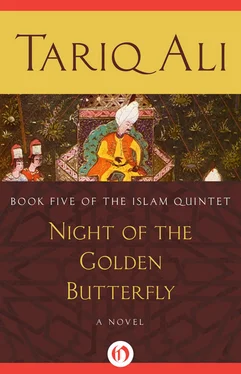Was it old friends I was mourning or an old city, an old world that had since changed so much and for the worse, a world in which expectations for a better future were always high and in which the ultra-Wahhabi beard, gangster politics and cancerous corruption had yet to appear and drown all hope. The Jamaat-i-Islami boys were present in miniscule numbers then, and would sometimes argue with us, replying parrot-like to all our criticisms with a single phrase, ‘Islam is a complete code of life,’ and that was how we used to address them. ‘Tell me something, Islam-is-a-complete-code-of-life, could it be true that we are descended from apes? Have you ever considered the possibility or studied the evidence?’
As I looked at the faded photographs in the old hall, the scene of so many tumultuous events, I saw a long-forgotten Pashtun face that made me smile. A decent human being but a terrible pedant, he had, to our great surprise, joined the army and risen to become a general. The last I heard of him was a description of his rage at being strip-searched at Dulles Airport while on his way to attend a Pentagon briefing in December 2001. We were all there on that wall, except for Plato, who of course never studied at the college. How strange it seems now, but none of us who congregated at our table each morning were believers. Not a single one. And that was normal. We were not alone.
A few elderly professors wandered over and greeted me warmly, insisting that they had shared the table. Some remembered defying the injunctions against political demonstrations and marching to the US Consulate to protest the murder of Patrice Lumumba in 1961. Others recounted episodes that had never taken place, an imagined past. I smiled. To each his illusions.
Before I left Lahore for England, I said farewell to all my old haunts except Zahid’s house, which his treachery had declared out of bounds. I loved and esteemed this city: its courage, which rivalled its cuisine; its wit and self-deprecatory humour; its energy, male and female; its cafés which, even after 1947, preserved a constancy and a depth of ideas; its softness or hard coarseness, depending on the occasion. The new suburbs that were being built when I left housed an altogether different class of citizens. These were young men born of provincial fathers or nouveau riche traders, who had moved to the city to increase their fortunes.
Plato loathed them as only he could, seeing comedy in what they regarded as virtue. He would insult them to their faces, saying they were the most obtuse and barbaric ruffians he had ever set his eyes on, even though he knew this was a slight exaggeration. He would mock their exaggerated mannerisms and body language, their snobbery and dress codes, their etiolated appearance and abominable egotism, but above all the callousness they displayed towards those they saw as their social inferiors. I knew some of them. In their favour it can be said that they did not yet carry weapons. Their children do.
At home, my mother was convinced that she had won me over, that there was no further cause for anxiety on the ‘China front’. She boasted to an older sister that everything had been handled with exquisite grace, the sort of remark a torturer might make after a prisoner he’s been working on is found dead. The core of her real world was made up of her sisters, a few younger women who doted on her every word, and her family, which meant my father and, alas, myself. As for my sisters, they were made to look pretty so that they didn’t disgrace her at public occasions, but their future was circumscribed by a single deadly institution: marriage.
She possessed many virtues, was amiable and generous most of the time, but prone, as I have said, to fits of uncontrollable rage. Plato accidentally witnessed one of these while visiting me and was impressed by it. She had assumed he was a tradesman.
Her own marriage to my father had not been strictly conventional, to put it mildly. An elopement and secret wedding; a scandal in the family; my grandfather threatening to kill her and himself if the marriage were not annulled; the anger of my paternal grandmother, from a more blue-blooded faction of the family and enraged that her son was not considered suitable simply because of his Communist views. It had all worked out in the end, and an official wedding, attended by the city’s notables, had duly taken place. All this should have made my mother more relaxed in her own views, but it was as if, having set an audacious fashion when she was young, she was now surprised by her own boldness, and she often displayed a pseudo-morality that was distressing to all of us. Were there other skeletons in her past of which we had no idea? Her semi-hysterical defence of monogamy, and this in a culture where monogamy is actively discouraged, has left me suspicious to this day. At the time, however, she appeared triumphant. She had wrecked my happiness and was boasting about her success to my father and her circle of intimates.
How wrong she was and how right as well, but not because of my apparent capitulation. It was Jindié who took my mother’s stupid strictures to heart. Suddenly we were no longer meant for each other. She was too old anyway. Why didn’t I marry one of my delectable cousins, as was the tradition in our family. They were ever so pretty. Surely I could inspect a few fifteen-year-old ones now so that they could be ready in a few years’ time. We belonged to different worlds. It was pointless annoying the family. She would not be seeking entry at Leeds University. We must not see or speak to each other again.
I was in a panic. How could this be? Why? She wouldn’t tell me. In desperation I went to see her mother, a woman of admirable impulses and rare good sense. Mrs Ma soothed my ego, but offered no advice. Her daughter was the only person who could decide, she told me with quiet pride. Confucius, too, understood my pain, but he was half-scared of Jindié’s sharp tongue and would never dream of defying her will. I needed Zahid and cursed him for having destroyed our friendship. Plato was useless in these matters, but said he would do anything to help, and he stressed the anything . It was then that a crazy idea began to form in my head, one with which Plato became centrally involved.
I HAD KEPT NOTHING secret from Jindié. My self-esteem vanished in her presence. Ever since the summer in Nathiagali, all verbal constraint between us had disappeared. Now I simply couldn’t understand the reasons for her emotional retreat. Perhaps she thought that some of my mother’s prejudices were genetic and were ingrained in the rest of us as well, but whatever it was I needed to know before I left. I had to lure her to a last, desperate rendezvous, but to reassure her that my intentions were pure, the location had to be simultaneously public and secret. The only place that fitted this description was the marble Mughal terrace in the Shalimar Gardens on the edge of the city.
‘How are you going to scale those walls in the moonlight without Satan’s help?’ Plato asked in despair. It was Thursday. My departure was planned for Sunday.
My plan was simple. I would convince Jindié to meet me one last time. She would tell her parents she was spending the night at the house of one of my female cousins. Plato, dressed as a chauffeur, would borrow a friend’s car and pick her up from home on Friday evening. They would meet me outside the Shalimar Gardens. It could work.
‘The gardens are locked. There are night watchmen. How will we get in?’
Plato had no idea that I had solved this one. Close family friends were the hereditary guardians of Shalimar, their reward for having tilled the soil and sown the seeds when the gardens — a Mughal passion — were being constructed. Anis, the younger son with languid eyes, a few years older than me, was a dear friend. Sent at a very young age to board at an English public school, he had first become a bit puffed up and then suffered a breakdown, from which he never fully recovered. His forebears had grabbed the adjoining lands when the Mughal Empire collapsed, and had become gentry. We used to laugh a great deal when his father, a radical member of Fatherland’s Constituent Assembly, described the rise of his family.
Читать дальше












